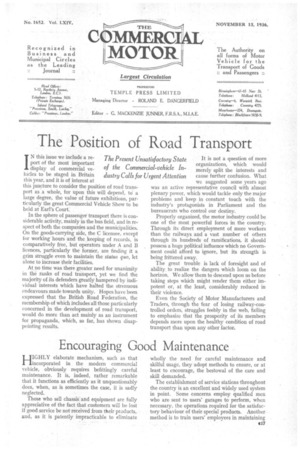The Position of Road• Transport
Page 71

If you've noticed an error in this article please click here to report it so we can fix it.
N this issue we include a re port of the most important display of commercial vehicles to be staged in Britain this year, and it is of interest at this juncture to consider the position of road transport as a whole, for upon this will depend, to a large degree, the value of future exhibitions, particularly the great Commercial Vehicle Show to be held at Earl's Court.
In the sphere of passenger transport there is considerable activity, mainly in the bus field, and in respect of both the companies and the municipalities. On the goods-carrying side, the C licensee, except for working hours and the keeping of records, is comparatively free, but operators under A and B licences, particularly the former, are finding it a grim struggle even to maintain the status quo, let alone to increase their facilities.
At no time was there greater need for unanimity in the ranks of road transport, yet we find the majority of its defenders greatly hampered by individual interests which have halted the strenuous endeavours made towards unity. Hopes have been expressed that the British Road Federation, the membership of which includes all those particularly concerned in the development of road transport, would do more than act mainly as an instrument for propaganda, which, so far, has shown disappointing results. It is not a question of more organizations, which would merely split the interests and cause further confusion. What we suggested some years ago was an active representative council with almost plenary power, which would tackle only the major problems and keep in constant touch with the industry's protagonists in Parliament and the bureaucrats who control our destiny.
Properly organized, the motor industry could be one of the most powerful forces in the country. Through its direct employment of more workers than the railways and a vast number of others through its hundreds of ramifications, it should possess a huge political influence which no Government could afford to ignore, but its strength is being frittered away.
The great trouble is lack of foresight and of ability, to realize the dangers which loom on the horizon. We allow them to descend upon us before taking steps which might render them either impotent or, at the least, considerably reduced in their violence.
Even the Society of Motor Manufacturers and Traders, through the fear of losing railway-controlled orders, struggles feebly in the web, failing to emphasize that the prosperity of its members depends more upon the healthy condition of road transport than upon any other factor.








































































































































































